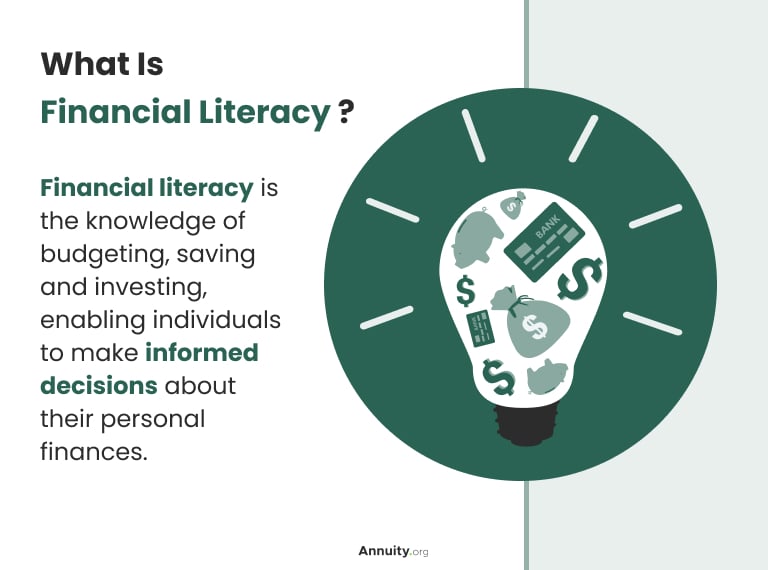Durchsuchen Sie die Webergebnisse zu dieser Domain.

We don’t have to tell you that financial literacy and education are vital aspects to financial institutions. But do we truly understand why? Read on to understand and embrace why we need to assi
Read on to understand and embrace why we need to assist our financial institution customers, how to increase their financial literacy, and how to educate them on financial topics important to their lives. Putting it in the simplest of terms, it’s the ability for an individual to balance a checkbook, understand personal income taxes, and create and maintain a budget. Investopedia defines financial literacy as “the ability to understand and effectively apply various financial skills, including personal financial management, budgeting and investing”. Sadly, there are many people who are financially illiterate and do not have a strong understanding of how money works in their personal lives.Today, very few states require high school students to take a course on financial literacy. That’s a scary thought. Financial literacy is a key component of life, and most individuals aren’t gaining enough knowledge in this area to be able to make wise financial decisions in adulthood.We all want to be successful, especially when it comes to this important topic. And, we want our customers to be wise with their money and the choices that follow. You would probably agree that the benefits of financial literacy and education are far-reaching.When it comes to our customers, we care about them. We don’t simply see our customers through a transactional lens; rather, it’s relational. And, what is one way to deepen these important relationships? Yes, financial literacy.

Regardless of what stage of life you’re in, these tips can help you build savings, reduce debt, boost income and invest wisely.
Some investors might not be sure where to start when it comes to things like choosing stocks and making sure a portfolio is balanced. Don’t be afraid to seek guidance from a financial advisor. You can choose a traditional financial advisor, who typically charges a fee of about 1 percent of your assets.One way to make paying yourself a priority is to set up automatic transfers from your bank account to a savings account or investment account. “Take a percentage of your paycheck or a random number and have it done automatically. Don’t think about it. Don’t go back to it. Just have it done,” says Ronit Rogoszinski, CFP and founder of Women+Wealth Solutions in Carle Place, New York. An emergency savings account is the foundation of a sound financial plan.Whether you’re talking about stocks and bonds, mutual funds, brokerage accounts or 401(k) retirement plans, virtually all investments involve fees or commissions that investors should understand. “Sometimes, the employer will subsidize some of the cost of a 401(k), and sometimes (it) will pass it all on to the employees,” says Cheryl Krueger, CFP, financial advisor with CGN Advisors in Inverness, Illinois.August 27, 2024. https://www.bankrate.com/banking/savings/saving-and-investing-tips/. Copied to clipboard! ... Karen Bennett is a senior consumer banking reporter at Bankrate. She uses her finance writing background to help readers learn more about savings and checking accounts, CDs, and other financial matters.
Core concepts to help build sound financial management skills in youth. ... In general, there are four main uses for money: spending, saving, investing and giving away.
Detailed plan A comprehensive wealth plan, also referred to as a financial plan, which helps guide individuals towards achieving more complex financial goals throughout their lifetimes and beyond. ... Your stage of life will greatly impact your financial picture now and in the future, and the financial and investment decisions you make. In general, there are three main wealth stages that individuals move through and between over the course of life: Early savers—Establishing career, perhaps buying a home, getting married or starting a family Main objectives: Earning, saving and growing assetsCore concepts to help build sound financial management skills in youth. ... In general, there are four main uses for money: spending, saving, investing and giving away.Identifying your short- and long-term financial goals will help determine which types of investments and planning approaches may be most suitable and effective to help you save for your needs.To help prioritize savings in your budget, consider setting aside a specific amount on a regular basis, such as through a pre-authorized contribution plan where funds are taken from your account on set days and deposited in an investment vehicle or savings plan. In creating a budget, it’s important to include and track: income, savings goals, fixed expenses and flexible expenses (needed and wanted). For a budget to be most effective, it’s important to factor in all lifestyle expenses and other financial components, and ensure they’re logged appropriately.


These books cover everything a beginner needs, from the basics of personal finance and investing to how the markets influence our money decisions.
These books cover everything a beginner needs, from the basics of personal finance and investing to how the markets influence our money decisions. ... If you’ve selected any of the answers above, you’re not alone. Taking the first step toward financial literacy is the hardest.Christine Benz, Morningstar’s director of personal finance and retirement planning, breaks financial planning down into bite-size chunks that anyone can handle. You start with basics like assessing your net worth and creating an organization system, and you progressively conquer more advanced topics including retirement investing, college savings, and estate planning. If you want to meld investment basics with tangible advice, this book is a great option. Read more: Our Best Investment Portfolio Examples for Savers and RetireesThe text is accessible and shorter than many other investing books, and it includes quotes from many prominent financial figures who support Bogle’s claims. 2) The Bogleheads’ Guide to Investing, by Taylor Larimore, Mel Lindauer, and Michael LeBoeufThe advice of The Vanguard Group founder John Bogle is echoed in this comprehensive guide for investors of all experience levels. Packaged into 23 short, lighthearted chapters, this book contains practical advice and explores many aspects of investing, from how to choose the financial lifestyle that fits you to how to balance your emotions to truly master your investments.
We look at the next generation of investors and how their investing preferences and habits differ from previous generations. Read more -> Exclusive content, detailed data sets, and best-in-class trade insights to rewrite your portfolio for tomorrow. Try it Now · The Value of Financial Literacy ...
Financial literacy (or lack thereof) can make a difference of $10,000+ Ignorance can be bliss, but when it comes to personal finance, it can also end up costing you a lot of money. Learn more -> ... The goal of this guide is to break down the basics of investing so that we can begin investing with confidence.We explore the key steps to attaining financial literacy and ways to improve your investing knowledge.Generation Z is a growing force in the markets, transforming the traditional nature of investing. Learn how Gen Zers are flexing their financial muscles. ... Vivian Tu, also known as @yourrichbff on TikTok, talked about helping those in marginalized communities gain financial confidence and the importance of having the tools of financial literacy.We look at the next generation of investors and how their investing preferences and habits differ from previous generations. Read more -> Exclusive content, detailed data sets, and best-in-class trade insights to rewrite your portfolio for tomorrow. Try it Now · The Value of Financial Literacy Accessibility to Underserved Communities


It provides basic information on managing money, checking out investments, and avoiding fraud, it offers guidance on making a financial plan, paying off debts, and starting to save and invest. ... Future Business Leaders of AmericaA guide to saving money, is a financial literacy toolkit aimed ...
It provides basic information on managing money, checking out investments, and avoiding fraud, it offers guidance on making a financial plan, paying off debts, and starting to save and invest. ... Future Business Leaders of AmericaA guide to saving money, is a financial literacy toolkit aimed at high school students.These free books offer strategies and practical advice to improve your financial health, from saving and investing to debt management. We invite you to explore our digital library and dive into a variety of resources designed to help you make informed financial decisions. Start downloading your personal finance books in PDF now and take the first step towards smarter and more secure financial management. ... Gary RabbiorA Guide to Financial Literacy, is a valuable resource that provides knowledge and skills for making responsible financial decisions.It provides essential information on personal finance, including topics such as budgeting, managing debt, and investing in the stock market. offers practical advice and resources to help students develop financial independence and make informed financial decisions. ... MyCreditUnion.govMoney Basics Guide to Budgeting and Savings, covers topics such as the importance of having a budget, developing a budget, committing to it, the significance of saving, developing savings habits, and setting saving goals. This guide aims to promote financial literacy and empower individuals to manage their money effectively.Looking for Personal Finance Books? Here we present 7 Personal Finance books that you can read for free and download in PDF.

With this list of our favourite courses, you can dig into many financial topics and start making better money decisions.
Financial literacy is an essential life skill. Whether you want to budget, saving, invest or plan for retirement, understanding how to manage money can help you achieve financial stability. Fortunately, there are many free courses that can help Canadians develop greater financial literacy.Lessons and course material had to be useful and relevant to Canadians. There are many courses that talk generally about finance and investing, but the information had to work under a Canadian lens to make our list. ... Financial literacy refers to having a good understanding of financial basics.Good financial literacy can help you feel more confident about making financial decisions, whether it’s managing debt, saving or investing. There are many easy ways to begin learning about money. For example, you can start by enrolling in one of the financial courses above.The acronyms were: TFSA (tax-free savings account), RSP (retirement savings plan), GIC (guaranteed investment certificates), ETF (exchange-traded fund), ESG (environmental, social and governance) and ROI (return on investment). Among those surveyed, 41% described themselves as “confident in their understanding of financial terminology.” This points to a gap between Canadians’ perceived and actual level of financial literacy.

(Family Features) Financial anxiety is on the rise in the United States, making financial literacy – simply put, the ability to understand and effectively utilize various money management practices including budgeting, investing and saving among...
(Family Features) Financial anxiety is on the rise in the United States, making financial literacy – simply put, the ability to understand and effectively utilize various money management practices including budgeting, investing and saving among others – as important as ever.Without this understanding of your income and expenses, you become vulnerable to making the wrong decisions and can put yourself at greater risk in the future. To further expand your knowledge base, consider taking a financial literacy quiz to test your understanding of concepts such as compounding interest, inflation and risk diversification.This “cushion” can contribute to greater confidence in your future financial outlook and stronger feelings of security going into waves of economic uncertainty. Test your literacy to assess your understanding and confidence around finances at WorldFinancialGroup.com.In fact, 36% of the U.S. general population feel anxious about their current financial situations with 26% feeling strained, according to research from World Financial Group. Taking steps to become more financially literate and manage money more effectively can help. While there isn’t one “right” way to gain financial literacy, these steps can help grow your understanding and confidence around your finances.

Growth and Returns: Understand ... measure investment success. · Assets and Liabilities: Recognize what constitutes assets that build wealth versus liabilities that can drain finances over time. Starting Young Introducing financial literacy at an early age mitigates future regrets. Teaching children about money management, how to save, and the ...
Growth and Returns: Understand terms like Compound Annual Growth Rate (CAGR), annual returns, and absolute returns to measure investment success. · Assets and Liabilities: Recognize what constitutes assets that build wealth versus liabilities that can drain finances over time. Starting Young Introducing financial literacy at an early age mitigates future regrets. Teaching children about money management, how to save, and the importance of investing can pave the way for a financially secure future.Representational Photo By Irshad Mushtaq Financial literacy is more than just understanding money; it's about mastering the skills and knowledgeConclusion Financial literacy serves as a foundation for making sound financial decisions. By learning about finances early on, you enable a future where you manage your money rather than being managed by it. By instilling these concepts from a young age, individuals can better avoid financial missteps and instead foster an environment where their finances contribute positively to their lives. · Learn from the insights of @Irshad Mushtaq, Writer, Investor, Entrepreneur & Founder of M I Securities!Lifelong Skills: Financial literacy equips you with knowledge on spending, saving, and investing.
We want financial literacy to be a part of your life. To that end, we have focused our resources on providing support and education on financial understanding for all students. The more you know, and the more tools you have at your disposal, the better prepared you will be for life at and beyond Harvard. In this guide, you'll find information on budgeting, credit, saving and investing...
We want financial literacy to be a part of your life. To that end, we have focused our resources on providing support and education on financial understanding for all students. The more you know, and the more tools you have at your disposal, the better prepared you will be for life at and beyond Harvard. In this guide, you'll find information on budgeting, credit, saving and investing, and taxes.Financial literacy: The more you know, and the more tools you have at your disposal, the better prepared you will be for life now and after Harvard.Think of this scenario: You want to pay off a student loan before graduation, how will you accomplish this? How much do you need to work? To save? The better you do now, the easier accomplishing future goals will become. Even now there may be long range financial goals that you start saving for. Here are some tips for investing in your long term financial goals.The longer the time frame for investment, the more you can increase the income potential of your investment. On the flip side, waiting to invest can make it more difficult to achieve your financial goals. Discover how much waiting to save could cost you with the SEC compound interest calculator.


5 Ways Teens Will Use Financial Literacy in Real Life. Teens ask and we answer: Will they will really use this course in their adult lives?
He opened his wallet and pulled out a detailed budget- including an “Engagement Ring” category. Then he reminded me that he had learned Financial Literacy during high school!) ... It’s never too early to learn about saving and investing…and even getting started on both!Download 7Sisters Financial Literacy from a Christian Perspective. Click the image above to periodically receive real homeschool value in your inbox. Blogger, curriculum developer at 7SistersHomeschool.com, counselor, life and career coach, SYMBIS guide, speaker, prayer person.Many teens are no-nonsense. They do not want to waste their time taking a course simply because it is a requirement for graduation. For instance, many states require a Consumer Math or Financial Literacy course for graduation.Years ago, 7Sister Sara began to teach our teens Financial Literacy. Those kids are now adults. They have told us that the skills they learned from Sara are skills that are helping them find financial success at this phase of life.

Patience: Financial literacy is a gradual process. Be patient and provide ongoing support and guidance. Teaching kids about personal finance is a vital investment in their future. By instilling good financial habits early on, you equip them with the tools they need to navigate life’s financial ...
Patience: Financial literacy is a gradual process. Be patient and provide ongoing support and guidance. Teaching kids about personal finance is a vital investment in their future. By instilling good financial habits early on, you equip them with the tools they need to navigate life’s financial challenges with confidence and responsibility.Discover strategies and practical steps for teaching kids financial literacy, empowering them with the new financial skills.Empowerment: Financial literacy empowers individuals to make informed decisions about spending, saving, and investing.Equipping children with strong personal finance skills is more important than ever. Teaching financial literacy is not just about managing money; it’s about making informed decisions, setting goals, and building a secure future.
There’s plenty to learn about personal financial topics, but breaking them down can help simplify things. To start expanding your financial literacy, consider these five areas: budgeting, building and improving credit, saving, borrowing and repaying debt, and investing.
Financial literacy helps you make smarter financial decisions. Learn about the five core concepts.Becoming more financially literate might make financial decisions related to loans, major purchases and investments less daunting. There’s no shortage of places to learn more about finances, but it’s important to learn from trustworthy sources. Join the millions using CreditWise from Capital One. ... Financial literacy is about understanding concepts like budgeting, building and improving credit, saving, borrowing and repaying debt, and investing—and having the ability to apply them to real-life situations.There’s plenty to learn about personal financial topics, but breaking them down can help simplify things. To start expanding your financial literacy, consider these five areas: budgeting, building and improving credit, saving, borrowing and repaying debt, and investing.And there are different levels of risk and return, depending on the investment. By becoming financially literate, you’ll be better able to make important financial decisions while understanding how those decisions will impact your current and future financial situation. This can help you reach your goals, build your savings, manage your money and avoid or navigate potential setbacks that could take a toll on your finances. Now that you understand why financial literacy matters, it may be helpful to see how financial literacy can directly benefit you:

And while that might seem like a long uphill climb, rest assured, saving as an adult starts in much the same way as it did with your piggy bank: start small, build your nest egg, and then, when you're comfortable, start investing so as to grow your money even more.
Financial freedom takes time. Shondaland is here to help with our series on all-things money. This installment: when, how, and where to save and invest.Thus, Shondaland, along with the help and expertise of MGO CPAs & Advisors accounting firm, is launching our financial education series, with the goal of helping anyone and everyone win at getting to your financial “happily ever after.” Designed to help you understand both what's influencing and driving our economy and also the fundamentals of basic fiscal planning, this information is designed to help you take control and effectively manage your finances now and as you plan for the future. You work hard, so, from budgeting to saving to investing, it’s all about making your money work hard for you, too. ... When you were a kid, there’s a good chance that you had a cute little piggy bank sitting right on your bedroom dresser. You were probably encouraged to put change, and sometimes even a dollar bill or two, into your bank to teach you how to save.Mutual Funds — Mutual Funds are a way of investing in companies through a 401(k) or Roth IRA. Mutual Funds are fairly easy to understand and track, but they do have fees which can eat into the profit you are making and they can also boost your tax bill at the end of the year. Once you’ve got the basics down, it’s time to speak to a financial advisor who can walk you through all of the above and how these concepts can help you grow a nice, healthy portfolio of investments that will, hopefully, yield returns that can either go toward retirement, savings, or, as long its responsible, a big purchase your life might require.And while that might seem like a long uphill climb, rest assured, saving as an adult starts in much the same way as it did with your piggy bank: start small, build your nest egg, and then, when you're comfortable, start investing so as to grow your money even more.

A guide for financial literacy tools and resources. ... Investing allows individuals to grow their money and receive long-term financial security. However, investing also carries risks as well, as you can lose money depending on the type of investment and changing economic and market conditions.
The Savings Bonds Growth Calculator is provided by TreasuryDirect, and allows users to calculate the future value of their money if they invest in U.S. Savings Bonds. ... What’s the best way to save for retirement and how much should you be saving for the future? What’s the difference between Roth and traditional IRA? Should you buy an annuity? These questions and more are answered here in a way that can help you make a plan for your financial future so you can retire when you’re ready.FINRA guide on 401(k) Basics, and additional information on contributions, managing your 401(k), rollovers, and more. ... This calculator can help you estimate how much to save each year to accumulate enough money for your projected retirement. Provided by Financial Industry Regulatory Authority (FINRA).Use this calculator to determine if you are on track to ‘save the max’ in your 401(k). Provided by Financial Industry Regulatory Authority (FINRA) 401(k) and IRA Required Minimum Distribution Calculator (FINRA) Use this calculator to determine your Required Minimum Distribution (RMD) from a traditional 401(k) or IRA. In general, your age and account value determine the amount you must withdraw. Provided by Financial Industry Regulatory Authority (FINRA)Bonds: "A bond is an investment representing a loan made by an investor to a borrower — typically a business or government entity. The borrower promises the debt will be paid back with interest at a specific time. Bonds are typically issued by companies, municipalities, states, and sovereign governments to finance projects and operations.
FinancialLiteracy101.org’s guide to personal finances offers tips for saving, budgeting, managing credit, and avoiding financial trouble.
Much of the material in this guide comes from our Financial Basics course, which concentrates on some of the basic knowledge young adults need to know - especially when transitioning to college. If you don't have access to Financial Literacy 101, these topics will get you started on the path to smart spending.Learn how to manage your money with our financial literacy guide.A budget is simply a spending plan that is based on your expenses and income. A written plan helps you stay on track, day to day and month to month, for meeting your financial goals. For most students, debt is a part of life. Federal student loans, for example, are debt, but they are also a sound investment in your future.Maintaining a spending plan can't eliminate all debt, but it will help to minimize unnecessary debt while building healthy financial habits that will serve you through graduation and beyond. Tuition is a major expense that is definitely worth the investment - every dollar spent on tuition will be returned many times over after graduation in the form of higher wages and increased job opportunities.

Financial literacy is the knowledge of various aspects of personal finance and the ability to make smart decisions about money. It includes preparing a budget, knowing how much to save, recognizing favorable loan terms, understanding what impacts credit, and distinguishing different investment ...
Financial literacy is the knowledge of various aspects of personal finance and the ability to make smart decisions about money. It includes preparing a budget, knowing how much to save, recognizing favorable loan terms, understanding what impacts credit, and distinguishing different investment options that can be used to save for retirement.Financial literacy empowers teens to use financial skills, including personal financial management, budgeting, and investing, to better their financial futures.Saving vs. Investing: What Teens Should Know ... Credit Cards vs. Debit Cards ... Financial literacy is the ability to understand and effectively use various financial skills, including personal financial management, budgeting, and investing.Although many skills might fall under the umbrella of financial literacy, popular examples include household budgeting, learning how to manage and pay off debts, and evaluating the tradeoffs between different credit and investment products.
:max_bytes(150000):strip_icc()/FinancialLiteracy_Final_4196456-74c34377122d43748ed63ef46a285116.jpg)
Source: U.S. Consumer Financial Protection Bureau · What are the key components of financial literacy? The five principles of financial literacy are knowing how to budget, save and invest your money, manage your debt, plan for your financial future and protect your assets through risk management.
You can access free financial planning tools through Investor.gov, the official website of the U.S. Securities and Exchange Commission. Tools include a Social Security estimator and a compound interest calculator. ... MyMoney.gov from the Federal Financial Literacy and Education Commission focuses on the five principles of financial literacy: earn, save and invest, spend, borrow and debt management, and protect.Risk is your exposure to danger, harm or loss through any financial transaction, especially those you make intending to profit from, such as an investment. Source: U.S. Consumer Financial Protection Bureau · What are the key components of financial literacy? The five principles of financial literacy are knowing how to budget, save and invest your money, manage your debt, plan for your financial future and protect your assets through risk management.Explore the principles of financial literacy and how they enable you to make better financial decisions and improve your financial health.Our expert reviewers hold advanced degrees and certifications and have years of experience with personal finances, retirement planning and investments. ... APA Annuity.org (2024, December 18). Financial Literacy: The 5 Principles Explained.


Looking to become more financially literate? Start applying these simple things to your routine and you'll have a strong grasp on your personal finances.
56% of American adults have less than $10,000 saved for retirement when you combine the 33% who have nothing saved with the 23% who have a small amount saved. (Time) Being financially literate means you have an understanding in few core areas: ... How investing works, 401k’s, the stock market, etc. Financial literacy is not something you will magically know either.Being financially literate or “having financial literacy” is not difficult to define. These terms simply mean you have a basic understanding of finances and that you have a grasp on the value of money. Understanding financial basics thus allows you and others to make smarter money choices and are able to be self-sufficient in financial decisions. ... You are able to understand financial issues everybody deals with like saving money, paying bills, debt management, investing, etc.Even if someone in your life does arm you with some money and investing insights, it’s on you as to what you do with that information. The good thing is, many school districts are starting to teach money lessons and add classes to the curriculum to help improve financial literacy early.This might not be talked about often, but financial literacy can really impact your knowledge about identity theft and scams in the finance space. You can start to catch any red flags with investing, banking, or any other money-making schemes.
Personal finance is where financial literacy translates into individual financial decision-making. How do you manage your money? Which savings and investment vehicles are you using? Personal finance is about making and meeting your financial goals, whether you want to own a home, help other members of your family, save ...
Personal finance is where financial literacy translates into individual financial decision-making. How do you manage your money? Which savings and investment vehicles are you using? Personal finance is about making and meeting your financial goals, whether you want to own a home, help other members of your family, save for your children’s college education, support causes that you care about, plan for retirement, or anything else.We’ve spent 25 years building and improving our resources to help you make smart financial and investing decisions. This guide is a great place to start, and today is a great day to do it. Let’s begin with financial literacy—what it is and how it can improve your life.Investopedia rounds up the best educational content for students, teachers, and anyone else interested in learning personal finance and investing.Add to this people’s increasing life spans (leading to longer retirements), Social Security benefits that barely support basic survival, complicated health or other insurance options, more complex savings and investment instruments to select from—and a plethora of choices from banks, credit unions, brokerage firms, credit card companies, and more. It’s clear that financial literacy is a must for making thoughtful and informed decisions, avoiding unnecessary levels of debt, helping family members through these complex decisions, and having adequate income in retirement.
:max_bytes(150000):strip_icc()/student_desk_laptop_notebook_AdobeStock_187280034-ecc982cbb4084a2b8a8e251b28c59fef.jpeg)








:max_bytes(150000):strip_icc()/FinancialLiteracy_Final_4196456-74c34377122d43748ed63ef46a285116.jpg)

:max_bytes(150000):strip_icc()/student_desk_laptop_notebook_AdobeStock_187280034-ecc982cbb4084a2b8a8e251b28c59fef.jpeg)